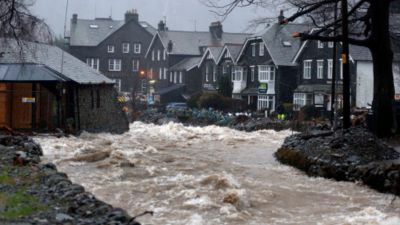Environment Agency issues new climate chance warning: 'Adapt or die'

The Environment Agency has issued a stark warning on climate change: "Adapt or die."
In a new report the Government body has preparations need to be made for the inevitable effects of climate change such as more flooding, an increased number of droughts and rising sea levels.
It has said that becoming resilient to these already inevitable effects - is just as important as actions to cut greenhouse gases and has called for investment now to adapt instead of dealing with the after-effects of not taking action.
The agency's chairwoman Emma Howard Boyd, warned that deadly events such as the flooding in Germany this summer would hit here if the country did not make itself resilient to the more violent weather the climate emergency was bringing.
This call comes less than three weeks before the COP26 summit in Glasgow and on the day that the organisation's chief executive - Sir James Bevan - visits Carlisle to visit the city's flood defences, which the agency has said provide 1,300 properties with extra protection.
In a report to the Government, the EA said climate change would exacerbate the pressure on England's water environment, which is suffering from problems such as pollution and increased water demand, and make it harder to ensure clean and plentiful water.
The agency alone cannot protect everyone from increasing flood and coastal risks, and traditional flood defences will not be able to prevent all flooding and coastal erosion, the report said.
There will be more and worse environmental incidents, such as flooding, water shortages and pollution, regulation is not ready for climate change and the natural world cannot adapt as fast as the climate is changing, the EA said.
Population growth and climate change will increase water demands and mean that, if no further action is taken between 2025 and 2050, more than 3.4bn extra litres of water per day will be needed for resilient public water supplies.
Hotter drier summers, rising sea levels and pressures from development are are adding to water supply issues for people, industry, agriculture, recreational river use and wildlife.
With 2C of global warming - below the level of warming for which the world is currently on track - England's winter rainfall will increase by around six per cent but summer rainfall will be down 15 per cent by the 2050s.
The report warns London's sea level is expected to rise by between 23cm and 29cm by the 2050s, and around 45cm at 2C of warming, or 78cm in a much hotter world by the 2080s.
The patterns of river flows will become more extreme and wet days could become more intense.
The Environment Agency said it was working with Government, businesses and communities on flood protection and with watchdog Ofwat on water supplies.
It also said it was focusing on restoring and creating peatlands, wetlands and other habitats to create resilient places for wildlife, reduce the risk of flooding, improve water quality and boost access to green spaces for people.
Ms Howard Boyd said:
She added: "While mitigation might save the planet, it is adaptation, preparing for climate shocks, that will save millions of lives.
"Choosing one over the other on the basis of a simple either/or calculation is like telling a bird it only needs one wing to fly."
She said despite the UK Government's focus on adaptation at Cop26, the issue was in danger of being "grievously undercooked" at the summit by the world at large.
"Significant climate impacts are inevitable. We can successfully tackle the climate emergency if we do the right things, but we are running out of time to implement effective adaptation measures," she said.
She added:
The warnings come in the Environment Agency's third adaptation report, submitted to the Government under the Climate Change Act.
Read more: